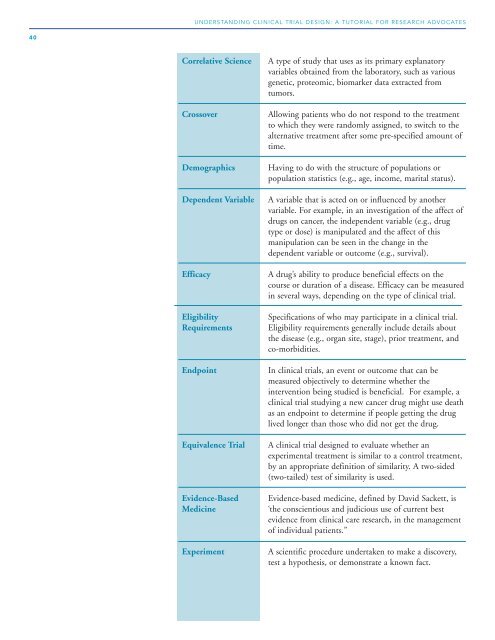Understanding Clinical Trial Design - Research Advocacy Network
Understanding Clinical Trial Design - Research Advocacy Network
Understanding Clinical Trial Design - Research Advocacy Network
You also want an ePaper? Increase the reach of your titles
YUMPU automatically turns print PDFs into web optimized ePapers that Google loves.
40<br />
UNDERSTANDING CLINICAL TRIAL DESIGN: A TUTORIAL FOR RESEARCH ADVOCATES<br />
Correlative Science A type of study that uses as its primary explanatory<br />
variables obtained from the laboratory, such as various<br />
genetic, proteomic, biomarker data extracted from<br />
tumors.<br />
Crossover Allowing patients who do not respond to the treatment<br />
to which they were randomly assigned, to switch to the<br />
alternative treatment after some pre-specified amount of<br />
time.<br />
Demographics Having to do with the structure of populations or<br />
population statistics (e.g., age, income, marital status).<br />
Dependent Variable A variable that is acted on or influenced by another<br />
variable. For example, in an investigation of the affect of<br />
drugs on cancer, the independent variable (e.g., drug<br />
type or dose) is manipulated and the affect of this<br />
manipulation can be seen in the change in the<br />
dependent variable or outcome (e.g., survival).<br />
Efficacy A drug’s ability to produce beneficial effects on the<br />
course or duration of a disease. Efficacy can be measured<br />
in several ways, depending on the type of clinical trial.<br />
Eligibility Specifications of who may participate in a clinical trial.<br />
Requirements Eligibility requirements generally include details about<br />
the disease (e.g., organ site, stage), prior treatment, and<br />
co-morbidities.<br />
Endpoint In clinical trials, an event or outcome that can be<br />
measured objectively to determine whether the<br />
intervention being studied is beneficial. For example, a<br />
clinical trial studying a new cancer drug might use death<br />
as an endpoint to determine if people getting the drug<br />
lived longer than those who did not get the drug.<br />
Equivalence <strong>Trial</strong> A clinical trial designed to evaluate whether an<br />
experimental treatment is similar to a control treatment,<br />
by an appropriate definition of similarity. A two-sided<br />
(two-tailed) test of similarity is used.<br />
Evidence-Based Evidence-based medicine, defined by David Sackett, is<br />
Medicine ‘the conscientious and judicious use of current best<br />
evidence from clinical care research, in the management<br />
of individual patients.”<br />
Experiment A scientific procedure undertaken to make a discovery,<br />
test a hypothesis, or demonstrate a known fact.


